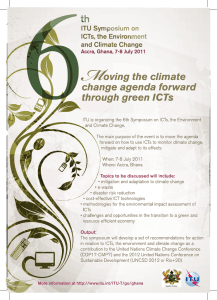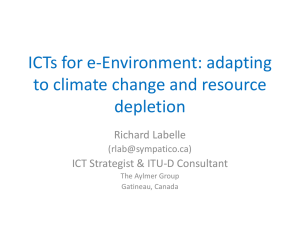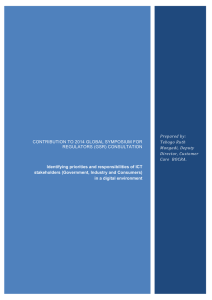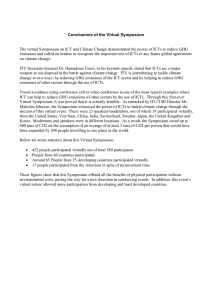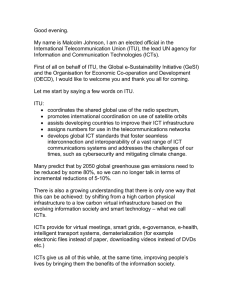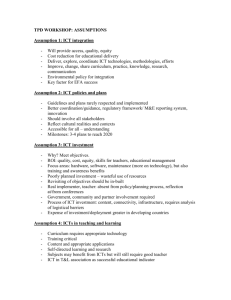OUTCOME OF THE 6 ITU SYMPOSIUM ON ICTs, THE
advertisement
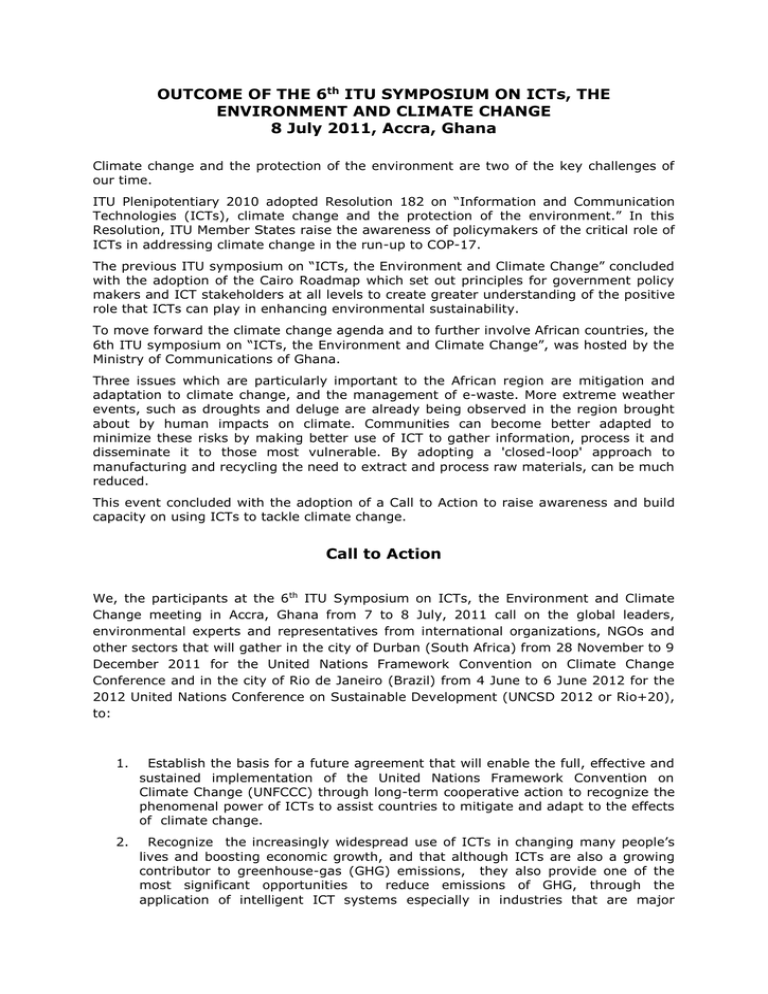
OUTCOME OF THE 6th ITU SYMPOSIUM ON ICTs, THE ENVIRONMENT AND CLIMATE CHANGE 8 July 2011, Accra, Ghana Climate change and the protection of the environment are two of the key challenges of our time. ITU Plenipotentiary 2010 adopted Resolution 182 on “Information and Communication Technologies (ICTs), climate change and the protection of the environment.” In this Resolution, ITU Member States raise the awareness of policymakers of the critical role of ICTs in addressing climate change in the run-up to COP-17. The previous ITU symposium on “ICTs, the Environment and Climate Change” concluded with the adoption of the Cairo Roadmap which set out principles for government policy makers and ICT stakeholders at all levels to create greater understanding of the positive role that ICTs can play in enhancing environmental sustainability. To move forward the climate change agenda and to further involve African countries, the 6th ITU symposium on “ICTs, the Environment and Climate Change”, was hosted by the Ministry of Communications of Ghana. Three issues which are particularly important to the African region are mitigation and adaptation to climate change, and the management of e-waste. More extreme weather events, such as droughts and deluge are already being observed in the region brought about by human impacts on climate. Communities can become better adapted to minimize these risks by making better use of ICT to gather information, process it and disseminate it to those most vulnerable. By adopting a 'closed-loop' approach to manufacturing and recycling the need to extract and process raw materials, can be much reduced. This event concluded with the adoption of a Call to Action to raise awareness and build capacity on using ICTs to tackle climate change. Call to Action We, the participants at the 6th ITU Symposium on ICTs, the Environment and Climate Change meeting in Accra, Ghana from 7 to 8 July, 2011 call on the global leaders, environmental experts and representatives from international organizations, NGOs and other sectors that will gather in the city of Durban (South Africa) from 28 November to 9 December 2011 for the United Nations Framework Convention on Climate Change Conference and in the city of Rio de Janeiro (Brazil) from 4 June to 6 June 2012 for the 2012 United Nations Conference on Sustainable Development (UNCSD 2012 or Rio+20), to: 1. Establish the basis for a future agreement that will enable the full, effective and sustained implementation of the United Nations Framework Convention on Climate Change (UNFCCC) through long-term cooperative action to recognize the phenomenal power of ICTs to assist countries to mitigate and adapt to the effects of climate change. 2. Recognize the increasingly widespread use of ICTs in changing many people’s lives and boosting economic growth, and that although ICTs are also a growing contributor to greenhouse-gas (GHG) emissions, they also provide one of the most significant opportunities to reduce emissions of GHG, through the application of intelligent ICT systems especially in industries that are major emitters, including energy generation, raw material extraction and refining, manufacturing and recycling, building construction and transport. 3. Further recognize that ICTs also reduce manufacturing needs by replacing material goods with virtual products, such as online music downloads. They provide the means for virtual meetings (to replace or reduce travelling), and intelligent transport systems to cut emissions and traffic congestion. ICTs are part of smart electricity grids that help distribute and use power more efficiently, help integrate renewable sources and assist in the integration of renewable sources, and accelerate the development of modern electricity infrastructure and services into developing countries. They also enable more efficient, better and cleaner water distribution. They underpin e-governance, e-health and e-education projects that reach many members of the community. ICTs are widely employed for environment and climate monitoring including weather forecasting, and are crucial in early-warning and disaster relief communications. 4. Take into account the role that ICT plays as a catalyst to climate change adaptation which will help countries’ preparedness for a more risky future. Global effort is required to enhance the effective us of ICTs for climate change adaptation. 5. Enhance the transformational role of ICT for climate change adaptation and disaster risk reduction, will require the use of three technology types: telecommunication systems, observation systems, and information systems. 6. Recognize that there is need to build capacities in developing countries to support ICT as tool for climate change adaptation and disaster risk reduction. Capacity development is required in three dimensions - institutional development, human resources enhancement and systems development, in particular, relating to legislative and regulatory frameworks. 7. Forge partnerships and engage all stakeholders to address climate change, due to its multi-disciplinary nature, is critical. There is the need to work closely with the private sector (especially within the ICT industry) and the youth on this front. 8. Emphasize that ICTs play a critical role in providing education and information through broadcasting, Internet and other means of communication and also the role played by ICTs in remote monitoring of the Earth by satellite and by sensors on the ground and in the ocean. 9. Note that the use of ICTs in monitoring can provide data and information on deforestation, for instance, or on crop patterns that indicate possible food shortages and that ICTs are vital in disaster alerting which is closely linked to climate change, and that ICT are essential in disaster response by humanitarian organizations and individuals. To meet this requirement, national Administrations, and intergovernmental space agencies have agreed to address several climate observing requirements such as protection of spectrum. 10. Recognize that the production and use of ICT equipment is increasing worldwide very fast, leaving rapidly growing amounts of e-waste behind. If not handled in a sound manner, e-waste poses a serious threat to human health, the environment and contributes substantially to GHG emissions. ICT equipment has to be managed in a life-cycle approach including design for easy reuse and recycling, systematic take-back systems, and energy efficient reuse and/or recycling procedures. E-waste avoidance and minimization has a huge potential to contribute to GHG emission reduction. We call upon: 11. The International Telecommunication Union (ITU) in accordance with Article 7.2 (l) of the United Nations Framework Convention on Climate Change (UNFCCC) and as the UN specialized agency for information and communication technologies (ICTs) with its membership of 192 governments and more than 700 private sector entities, to lead an ICT coalition urging COP17 delegates to look to the enormous potential of ICT solutions to cut emissions across all sectors. 12. UNFCCC delegates to make specific mention of ICTs in the negotiating text. The adoption of an agreed methodology for measuring the carbon footprint of ICT equipment and its inclusion in National Adaptation/Mitigation Plans, would provide an incentive to the ICT industry to invest in developing countries, help reduce the digital divide, and at the same time help fight climate change – a win-win scenario. 13. UNFCCC delegates to increase ICT investment and funding at the next round of negotiations to be held in Durban, South Africa when considering the progress in operationalising new institutions such as the Technology Mechanism and Green Climate Fund. Now it is time to move the climate agenda forward and advance the implementation of the UNFCCC Convention by promoting the use of ICTs for the benefit of all countries ensuring that the digital divide is bridged with the aim of achieving climate justice.

